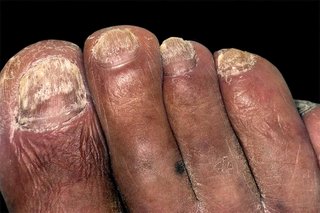Fungal nail infection
You may have a fungal nail infection if your nail is brittle, discoloured or thicker than usual. These types of infections are not serious but they can take a long time to treat.Symptoms of a fungal nail infection
Fungal nail infections usually affect your toenails, but you can sometimes get them on your fingernails, too.

A pharmacist can help with fungal nail infections
Speak to a pharmacist if the look of your nail bothers you or it's painful.
They may suggest trying an antifungal nail medicine that you brush onto the affected nail.
These medicines:
- should be used daily or weekly, depending on the type
- need to be used for 6 to 12 months – it may take several months before you start to see an improvement
- may not be suitable for you if you're under 18, pregnant or breastfeeding
The infection is cured when you see healthy nail growing back at the base.
Non-urgent advice: See a GP if:
You have a fungal nail infection and:
- the infection is severe and treatment has not worked
- the infection has spread to other nails
- you have diabetes – foot problems can be more serious if you have diabetes
- you have a weakened immune system – for example, you have had an organ transplant or are having chemotherapy
Treatment for a fungal nail infection
A GP can prescribe antifungal tablets if you have a fungal nail infection and treatments from a pharmacy have not worked.
But before they give you tablets, they should take a sample of your nail and have it tested, to find out what type of infection you have.
You may also need to have a blood test before starting treatment and during treatment to check your liver is working properly.
You may need to take antifungal tablets for up to 6 months.
The tablets can have side effects, including:
- headaches
- an itchy rash
- stomach ache
- feeling sick and diarrhoea
You cannot take antifungal tablets if you have certain conditions, such as liver or kidney disease. They may also not be suitable if you're pregnant or breastfeeding.
Badly infected nails sometimes need to be removed. It's a small procedure done while the area is numbed (under local anaesthetic).
Preventing fungal nail infections
You can get a fungal nail infection if your feet are constantly warm and damp.
You're more likely to get an infection if you wear trainers for a long time and have hot, sweaty feet.
There are some things you can do to help prevent fungal nail infections.
Page last reviewed: 27 March 2024
Next review due: 27 March 2027